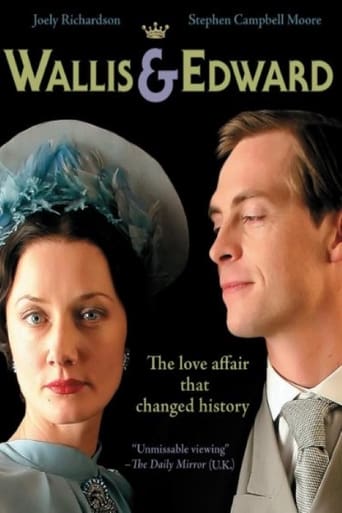

This story of a ruptured line of monarchs seems like a very touching love story where the woman is portrayed as a sacrificing and sincere partner. However, most historical material speaks of a different Wallis Simpson--one who was eternally ambitious and actually never recovered from her inability to serve as Queen. In fact, in her own words, "You have no idea how hard it is to live out a great romance." They did not have the eternal love-flame of romance and it is believed that tolerance on both their parts was a key element in the marriage. History and reality aside, the movie presented a decent story line on its face. Wallis Simpson was no innocent flower. Edward may or may not have regretted his abdication--even to himself--but he became known more for suspected Nazi sympathizing during World War II than any other cause of noble intention. What is probably the best result of the royal mess is that the many interpretations of the love affair and marriage became a magnet for rich and poor alike.
... View MoreI read where this dramatization was suppose to be mostly from Wallis' perspective and as such it succeeds. Once she discovered she had dug herself a great big hole she tried like heqq to get out,but alas, she couldn't because her stupid boy-friend, the King of England was in it with her, and her fear of being alone, plus her exile to France thus virtual isolation from him prevented her from knocking some sense into his tiny little brain.Well, good for England and the world in the long run, because if she had been allowed to marry and he remain king, it would have been a disaster for England and the world, since, although quite charismatic and popular, as a monarch he was woefully inadequate.This story is fluffy and gives us a simple picture of the events that took place, but it's somewhat laughable in parts where the dialog (this is 1935-1936) resorts to her saying things like "..flavor of the month.." and describing her feelings toward him to include their intimacy and "..all that other stuff.." It also fails to mention that the primary reason (beyond simple politics)is that he could not marry her was because, as the leader and the defender of the Church of England, he was forbidden to marry a divorced woman and by now she was twice divorced. Edward (David) loved her, she obviously was great in the physical romance department whereas he was privately mimicked, by those who knew, to be inadequate there as well. So, the whirlwind took hold and before she knew it, or could put a stop to it, she got caught in a trap and like the old Elvis Presley song, and there was no way out.So he abdicated, married her and for 35 years they because the most useless couple on earth. Google them and look for the picture of them outside the châteaux in France where they were just married. They are the two most unhappy looking bride and groom you will ever set eyes upon.In short, historically, Edward (David) was stupid, Wallis trapped herself and the whole thing was an unmitigated disaster except for the blessing that the world was rid of this silly little man who would have been an awful monarch.
... View MoreThis would have been OK if only they had chosen a more suitable actor for Edward. Stephen Campbell Moore is 14 years too young for the role of Edward as he was in 1936. He comes across as the nice boy next door who made everyone proud by winning a scholarship. He does not seem at all like a playboy prince of doubtful brainpower. Campbell Moore's Edward would have been intelligent and dutiful and would never have given up the throne for an American divorcée. This comes over very strongly in the scene where his father, George V, tells him "You disgust me". Not even the most crusty old Victorian could have said that to clean-cut Campbell Moore. Ms Richardson is good as Wallis, except that she is rather better looking than the original. Actually, I preferred the old version with Edward Fox and Cynthia Harris.
... View MoreYet another Mills & Boon type foray into the unfortunate love affair between the "traitor king" (Edward VIII...David to the family) and his American paramour, but this one was all a bit one-sided and wishy-washy.Wallis Simpson was a woman of questionable character and a chequered past. The suggestion bandied about that she had been a whore in a Chinese brothel, was I'm sure pure fiction, but the feeling that (as quoted in the film) "there's no smoke without fire", gave impetus to the general consensus of the day (although there was a certain popular sympathy with Edward's predicament), that the woman of his choice should not become queen.Although obviously not as black as the media of the time painted her, she was certainly a woman of the world, and I don't believe for a moment that she hadn't really got designs on becoming Edward's consort. If she had known at the outset that she would never become queen, I doubt if the romance would ever have gone the distance. As it was, and I suppose to her credit, the future marriage (if not the passion) did last, but she lived it in disappointment and disillusionment, and after him giving up everything and bringing the whole British Empire into turmoil, probably felt she couldn't leave him. Anyway, she may not be a king's consort, but she had gained a certain status, and wealth. And who knows...? But as everyone does know, the fairy tale turned into a pointless, roundabout existence, including a hopeful collusion with the Nazis, (in particular von Ribbentrop, a close friend of Mrs Simpson) who wanted to put Edward back on the throne as a puppet king to prevent any interference from Britain to Hitler's nasty little designs in Europe. I wonder how world history would have changed had the plan succeeded.There is no doubt that Edward and Wallis were sympathetic to this aim, and even before their marriage they both had friends in, and an admiration for, the Nazi regime, and he especially for everything German.Given Winston's anti-Nazi views, Churchill surprisingly had supported the intended nuptials, but maybe as he was still in his "wilderness years" at the time, could have had his own agenda in mind. However, the bulk of the British Establishment must have been extremely jittery.Apart from the actual Constitutional crisis, which of course was the primary concern, I believe this underlying factor was one of the unsaid objections to the marriage, and why the couple were eventually exiled to far off domains. Objections due to Wallis's background, her divorces, her foreign nationalism etc., were valid, but could have been overcome (unless she was a Roman Catholic, which she wasn't) and let's face it, the British royal families have been dealing with situations like that for centuries. But in view of increased European tensions and possible and impending hostilities, a potential Nazi collaborator on the throne could have been a little awkward to say the least. That Edward was besotted with the influential Wallis is well recorded and being a puppet on a woman's string is one thing, but to be the puppet of a psychotic dictator is quite another. So in hindsight, the abdication was perhaps a blessing in disguise.Of course, none of the treacherous and treasonable qualities of "Romeo" Windsor and "Juliet" Simpson were shown to any great extent in this somewhat insipid and inferior re-telling of "Edward & Mrs Simpson", and why it was ever made is beyond me, but if you're a fan of the likes of "Brief Encounter" or Barbara Cartland, you'll probably love it. And I suppose it might just encourage the modern generation to delve into the history books.The dialogue was slow and laboured at times and was only dragged along by the experience of an impressive cast, of which the acting honours have to go to Margaret Tysack as Queen Mary, the veteran Richard Johnson as Stanley Baldwin, and the ever excellent David Calder as a refreshingly look-alike Churchill.Apparently the main attribute of Wallis Simpson was not so much her beauty, but her charm. Sad to say an irritating Joely Richardson exuded no charm whatsoever, nor for that matter, very many of her acting skills either, and her terribly contrived American accent grated on the nerves. (Why couldn't an American have been awarded the part? Seems logical to me.) Stephen Campbell Moore as the love-lorn and beleaguered prince looked so wooden and listless throughout most of the proceedings, that I wasn't sure he'd even make it to the abdication, let alone the wedding. However, he livened up a bit towards the end.When I saw the preview on this production and its subject matter, I thought "Oh Lord, not again", but then considered that maybe it would shed a different light on the events. It didn't. Nevertheless I struggled gamely through it, but overall the boredom of this over-trodden story was only relieved by the commercial breaks, and of course it's conclusion.I hope this is the end, for surely enough has been sung of the whole dismal song, about this sorry little Merryman and his Maid. As it happened Edward was not really missed. King George VI (Bertie to the family), unlike Edward, was loved by everyone, and without him we wouldn't have had the present queen.I must conclude by saying that my father used to proudly wear a "Windsor" knot in his necktie. From the day of Edward's abdication he never wore that style of knot again, and his subsequent comments on the real Wallis and Edward are unrepeatable.NB. Eduncan-1 is misinformed. Ernest Simpson was American-born, naturalised-British, but certainly not English. Eduncan-1 should also get his facts right.
... View More